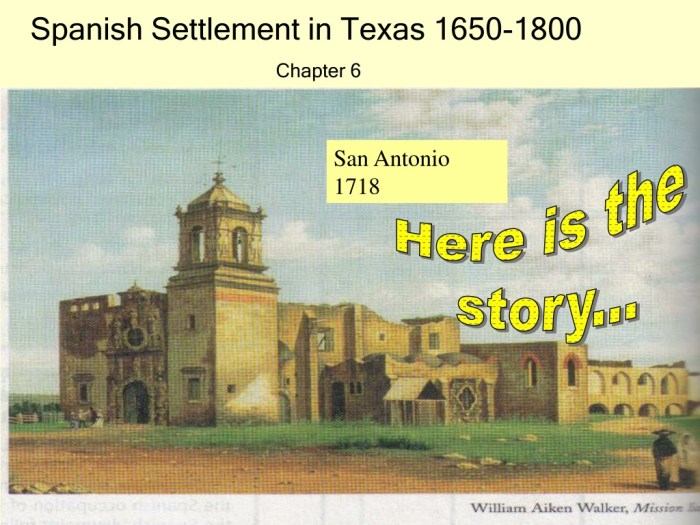Which statements characterize spanish settlement in texas? This essay will explore the various factors that influenced Spanish settlement in Texas, including missionary influence, economic motives, military presence, cultural exchange, and land grants. By examining these factors, we can gain a deeper understanding of the motivations and strategies behind Spanish colonization in this region.
Spanish settlement in Texas was a complex and multifaceted process that involved a range of factors. Missionaries, economic incentives, military presence, cultural exchange, and land grants all played significant roles in shaping the development of Spanish settlements in Texas.
Missionary Influence
Spanish missionaries played a crucial role in the establishment of settlements in Texas. They established missions, which served as centers for religious conversion, cultural assimilation, and economic development.
Missionaries used various methods to convert Native Americans, including preaching, education, and the establishment of missions. Missions provided a safe haven for Native Americans, offering protection from raids and access to food, shelter, and healthcare.
Missionary activities had a significant impact on the development of Spanish settlements. Missions became centers of community, fostering economic growth and cultural exchange. They also served as outposts for Spanish expansion, helping to secure the territory and extend Spanish influence.
Economic Motives: Which Statements Characterize Spanish Settlement In Texas

Economic incentives played a major role in driving Spanish settlement in Texas. The region’s vast natural resources, including minerals, fertile land, and abundant water, attracted Spanish settlers.
Mining was a significant economic activity, with Spanish settlers extracting silver, gold, and copper. Ranching also became a major industry, with Spanish settlers introducing cattle and horses to the region. Agriculture played a vital role in supporting the growing population, with settlers cultivating crops such as corn, wheat, and beans.
Economic factors shaped the location and growth of Spanish settlements. Settlements were often established near mining sites, ranching areas, and fertile land. The need for transportation and trade routes also influenced the development of settlements.
Military Presence

The Spanish military played a crucial role in securing Spanish settlements in Texas. The Spanish used a combination of forts, presidios, and alliances with Native American tribes to maintain control over the territory.
Forts were fortified structures that provided protection against attacks from Native Americans and other European powers. Presidios were military outposts that served as centers for military operations and provided support for settlers.
Alliances with Native American tribes were essential for the Spanish to maintain their presence in Texas. These alliances provided the Spanish with valuable military support and helped to secure the territory from rival powers.
Cultural Exchange
Spanish settlement had a profound impact on the culture of Texas. The blending of Spanish, Native American, and Mexican influences created a unique and vibrant cultural heritage.
Spanish language, music, and cuisine became integral parts of Texan culture. Spanish architecture, such as missions and haciendas, can still be seen throughout the state. The cultural exchange between Spanish settlers and Native Americans also influenced the development of Texan art, crafts, and traditions.
Land Grants

The Spanish used a system of land grants to encourage settlement in Texas. These grants gave individuals or families the right to own and use land in the territory.
There were different types of land grants, including grants for farming, ranching, and mining. The requirements for obtaining a land grant varied depending on the type of grant and the individual’s status.
Land grants had a significant impact on the development of Spanish settlements and the distribution of land ownership in Texas. They helped to attract settlers and promote economic growth. However, they also led to land disputes and conflicts between settlers and Native Americans.
FAQ Insights
What were the main motivations for Spanish settlement in Texas?
The main motivations for Spanish settlement in Texas were to spread Catholicism, expand their empire, and exploit the region’s economic resources.
What role did missionaries play in Spanish settlement in Texas?
Missionaries played a crucial role in Spanish settlement in Texas. They established missions among Native American tribes, converting them to Catholicism and teaching them European agricultural practices.
How did the Spanish military contribute to the settlement of Texas?
The Spanish military played a vital role in the settlement of Texas. They established forts and presidios to protect settlements from attack by Native Americans and other European powers.
What was the impact of Spanish settlement on Texas culture?
Spanish settlement had a profound impact on Texas culture. It introduced Catholicism, the Spanish language, and European agricultural practices to the region.